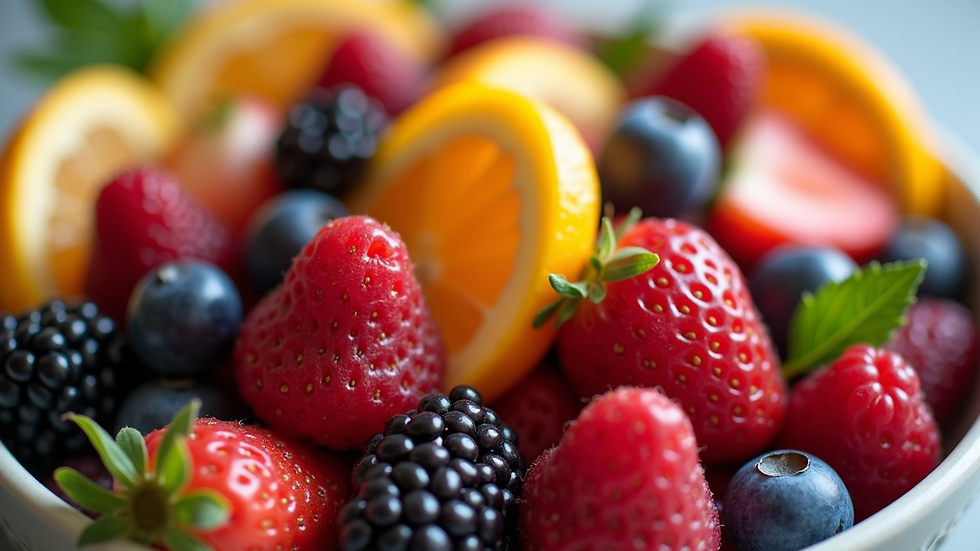Healthy Skin: Essential Nutrients for Radiant Beauty
- marcar98
- Sep 25
- 4 min read
In our quest for beauty, we often focus on skincare products, treatments, and routines. However, the secret to radiant skin lies not just in what we apply on the surface, but also in what we put into our bodies. The nutrients we consume play a crucial role in maintaining healthy skin. In this post, we will explore the essential nutrients that contribute to glowing skin and how you can incorporate them into your diet.
The Importance of Nutrition for Skin Health
Our skin is the largest organ of our body, and it reflects our overall health. When we nourish our bodies with the right nutrients, our skin can thrive. A balanced diet rich in vitamins, minerals, and antioxidants can help combat skin issues such as dryness, acne, and premature aging.
Nutrition affects skin health in several ways:
Hydration: Proper hydration keeps skin plump and elastic.
Cell Repair: Nutrients aid in the repair of skin cells and tissues.
Protection: Antioxidants protect the skin from damage caused by free radicals.
By understanding the essential nutrients for skin health, we can make informed choices about our diets.
Key Nutrients for Radiant Skin
1. Vitamin C
Vitamin C is a powerful antioxidant that helps protect the skin from damage caused by UV rays and pollution. It also plays a vital role in collagen production, which keeps skin firm and youthful.
Sources of Vitamin C:
Citrus fruits (oranges, lemons, grapefruits)
Berries (strawberries, blueberries)
Kiwi
Bell peppers
Broccoli
Incorporating these foods into your diet can help boost your vitamin C levels and improve your skin's appearance.
2. Vitamin E
Vitamin E is another antioxidant that helps protect the skin from oxidative stress. It also aids in skin repair and can help reduce the appearance of scars and fine lines.
Sources of Vitamin E:
Nuts (almonds, hazelnuts)
Seeds (sunflower seeds)
Spinach
Avocado
Olive oil
Adding these foods to your meals can enhance your skin's health and provide a natural glow.
3. Omega-3 Fatty Acids
Omega-3 fatty acids are essential fats that help maintain the skin's lipid barrier, keeping it hydrated and preventing dryness. They also have anti-inflammatory properties, which can help reduce redness and irritation.
Sources of Omega-3 Fatty Acids:
Fatty fish (salmon, mackerel, sardines)
Chia seeds
Flaxseeds
Walnuts
Algal oil
Including these foods in your diet can help support your skin's health and overall well-being.
4. Zinc
Zinc is a mineral that plays a crucial role in skin health. It helps with cell regeneration, wound healing, and can even help reduce acne. A deficiency in zinc can lead to skin issues such as dryness and irritation.
Sources of Zinc:
Meat (beef, chicken)
Shellfish (oysters, crab)
Legumes (chickpeas, lentils)
Nuts and seeds
Whole grains
Ensuring you get enough zinc can help keep your skin clear and healthy.
5. Biotin
Biotin, also known as vitamin B7, is essential for maintaining healthy skin, hair, and nails. It helps improve skin hydration and can reduce the appearance of dryness and flakiness.
Sources of Biotin:
Eggs
Nuts (almonds, walnuts)
Seeds (sunflower seeds)
Sweet potatoes
Spinach
Incorporating biotin-rich foods into your diet can help promote a radiant complexion.
Hydration: The Unsung Hero
While nutrients are vital for skin health, hydration is equally important. Drinking enough water helps maintain skin elasticity and prevents dryness. Aim for at least eight glasses of water a day, and consider incorporating hydrating foods into your diet, such as:
Cucumbers
Watermelon
Oranges
Strawberries
Celery
Staying hydrated not only benefits your skin but also supports overall health.
Lifestyle Factors That Affect Skin Health
In addition to nutrition, several lifestyle factors can impact your skin's appearance. Here are some key considerations:
1. Sleep
Getting enough sleep is essential for skin repair and regeneration. Aim for 7-9 hours of quality sleep each night to allow your skin to recover from daily stressors.
2. Stress Management
Chronic stress can lead to skin issues such as acne and eczema. Incorporate stress-reducing activities into your routine, such as yoga, meditation, or deep breathing exercises.
3. Sun Protection
Protecting your skin from harmful UV rays is crucial for maintaining its health. Use sunscreen daily, wear protective clothing, and seek shade when the sun is at its strongest.
4. Avoid Smoking and Excessive Alcohol
Both smoking and excessive alcohol consumption can lead to premature aging and skin damage. Limiting these habits can significantly improve your skin's appearance.
Putting It All Together
Achieving radiant skin is a holistic process that involves nourishing your body from the inside out. By focusing on essential nutrients, staying hydrated, and adopting a healthy lifestyle, you can enhance your skin's health and beauty.
Sample Meal Plan for Healthy Skin
To help you get started, here is a simple meal plan that incorporates skin-loving nutrients:
Breakfast: Smoothie with spinach, banana, almond milk, and chia seeds.
Snack: A handful of mixed nuts (almonds, walnuts, and hazelnuts).
Lunch: Grilled salmon salad with mixed greens, cherry tomatoes, and avocado.
Snack: Sliced cucumber and hummus.
Dinner: Quinoa bowl with roasted sweet potatoes, black beans, and bell peppers.
Dessert: Fresh berries with a dollop of yogurt.
This meal plan is packed with vitamins, minerals, and healthy fats that support skin health.
Final Thoughts on Radiant Skin
Your skin is a reflection of your overall health, and nourishing it with the right nutrients can lead to a radiant complexion. By focusing on a balanced diet rich in vitamins, minerals, and antioxidants, you can support your skin's health and beauty. Remember to stay hydrated, manage stress, and protect your skin from the sun.
With these tips in mind, you can embark on your journey to achieving healthy, glowing skin. Embrace the power of nutrition and watch your skin transform into a beautiful canvas of health and vitality.



Comments